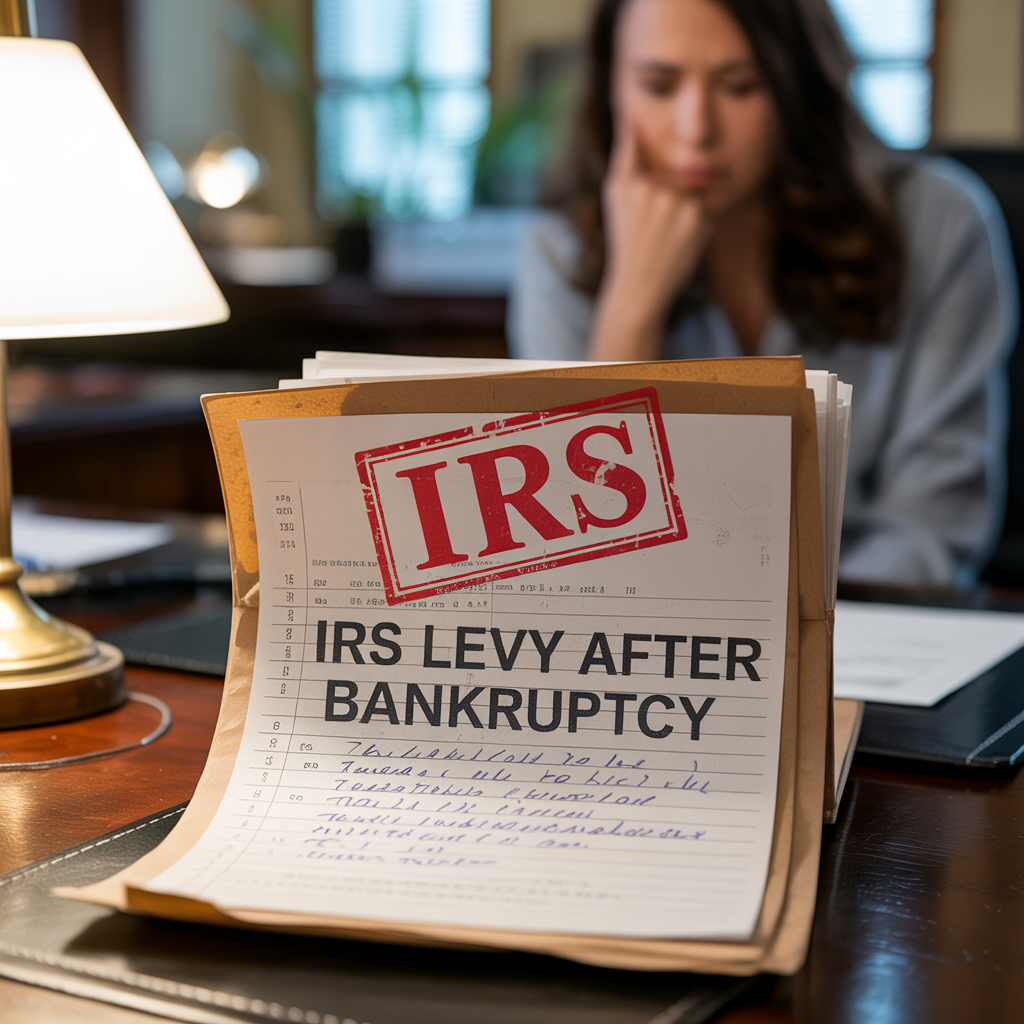IRS Levy After Bankruptcy – Is It Legal?

IRS Levy After Bankruptcy – Is It Legal?
You filed for bankruptcy. You got the discharge. And yet… the IRS is still trying to collect.
Is this legal?
Sometimes yes. But if the IRS levies after a proper bankruptcy discharge, you may be able to get the levy removed and the money refunded.
Understanding IRS levies and the 10-year statute
is also key here—because the IRS has limited time to collect, and bankruptcy can shorten that window.
What Happens to IRS Debt in Bankruptcy?
In Chapter 7, certain IRS debts may be discharged if:
- The return was due at least 3 years ago
- The return was filed at least 2 years ago
- The tax was assessed at least 240 days before filing
- No fraud or evasion is involved
If all conditions are met, the IRS cannot legally enforce that debt—including levying your wages or bank accounts.
If you’ve ever said, IRS seized my bank account, and it happened after a bankruptcy discharge, you may be entitled to get that money back.
When Can the IRS Levy After Bankruptcy?
The IRS can levy after bankruptcy if:
- The debt was
not discharged
- You filed
Chapter 13 and the case was dismissed
- The IRS was excluded from your creditor list
- You
accrued new debt after the bankruptcy
It’s also important to understand IRS levy vs lien differences: a levy is an immediate seizure of assets (like wages or bank accounts), while a lien is a legal claim recorded against your property. After bankruptcy, liens may still survive even if some debts are discharged.
What If the IRS Is Wrong?
If you were discharged and the levy is illegal:
- Request an immediate
levy release
- Provide your
discharge order and case number
- File
Form 911 for Taxpayer Advocate intervention
- Consider filing a wrongful levy claim under IRC §6343
We Help California Taxpayers Stop Post-Bankruptcy IRS Levies
At Boulanger CPA and Consulting PC, we:
- Identify whether IRS debt was properly discharged
- File for levy release or reversal
- Communicate directly with IRS collections
- Protect your rights under bankruptcy law
📞 Call
(657) 218-5700 or visitwww.orangecounty.cpa to protect your rights and explore more in Defend What’s Yours.
Frequently Asked Questions
Does bankruptcy stop an IRS levy?
Yes. Filing bankruptcy generally creates an automatic stay, which halts IRS collection actions including bank levies, wage garnishments, and property seizures.
Can the IRS levy me after bankruptcy?
It depends. If your tax debt was not discharged in bankruptcy, the IRS may resume collection after the case is closed or the stay is lifted.
Which tax debts are dischargeable in bankruptcy?
Generally, income taxes older than three years may be dischargeable if returns were filed on time and no fraud was involved. Payroll taxes and recent debts are not dischargeable.
What if the IRS tries to levy a discharged debt?
If the IRS mistakenly levies after your tax debt was discharged, you can file a motion with the bankruptcy court or request an immediate release of levy.
Can bankruptcy remove IRS liens as well as levies?
No. Bankruptcy may discharge the debt, but tax liens filed before bankruptcy usually remain attached to property until paid or released.
Does California’s FTB follow the same rules?
Yes. The FTB must also stop collections during bankruptcy. However, some state tax debts may survive bankruptcy if they are not dischargeable.
Should I get professional help with tax and bankruptcy issues?
Yes. Coordinating bankruptcy with IRS or FTB debt resolution is complex. A CPA or tax professional ensures you get maximum protection and relief.
📣 About the Author
Marc Boulanger, CPA is the founder of Boulanger CPA and Consulting PC, a boutique tax resolution firm based in Orange County, California and trusted by high-income individuals and business owners across Southern California.
He is the author of Defend What’s Yours: A California Taxpayer’s Guide to Beating the IRS and FTB at Their Own Game, available now on Amazon. The book offers a step-by-step plan for resolving IRS and FTB tax debt without losing your business, your home, or your peace of mind.
With over a decade of experience resolving high-stakes IRS and State tax matters, Marc brings strategic insight to complex cases involving wage garnishments, bank levies, unfiled returns, and six-figure tax debts. He is known for helping clients reduce or eliminate tax liabilities through expertly negotiated settlements and compliance plans.
Marc is a Certified Public Accountant licensed in California and Oklahoma and holds the designation of Certified Tax Representation Consultant. He is a member of the American Society of Tax Problem Solvers (ASTPS) — the national organization founded by the educators and practitioners who have trained thousands of CPAs, EAs, and tax attorneys in IRS representation strategy.
Every case is handled with discretion, proven methodology, and direct CPA-led representation — not call center scripts.
📍 Learn more at www.orangecounty.cpa or call (657) 218-5700.










